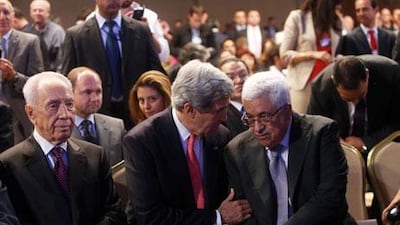RAMALLAH // When he returns to the region this week, the US secretary of state, John Kerry, faces little change in the sceptism from Israelis and Palestinians of the negotiations he has strived to restart.
Neither side appears any closer to reviving the moribund peace process despite the handsome inducements dangled in front of them.
Instead, Palestinians and Israelis have turned to trading criticism over the lack of progress on Mr Kerry's initiative and hedging against the fallout of its potential failure, analysts say.
"They're putting blame on each other for the lack of progress, and once you do that, psychologically, you put each other on the defensive," said Yehudit Auerbach, professor of political science at Israel's Bar-Ilan University.
Both sides were preoccupied with not being "seen as the one to blame for failure", she added.
Mr Kerry, on his fifth visit to the region this year, will make stops in Israel, the West Bank and Jordan to cajole leaders back to the table.
On previous trips he has offered impressive incentives, including a sweetened version of the 2002 Arab Peace Initiative that offers Israel normal relations with the 22-member Arab League, as well as a US$4 billion (Dh14.7bn) economic aid proposal for the Palestinians.
Mkhaimar Abusada, professor of political science at Gaza's Al Azhar University, said that both sides think "Kerry hasn't made progress - there doesn't seem to be any breakthrough happening at all".
Mr Kerry had failed to "bridge" the gaps between Israelis and Palestinians on the core issues, including Jewish settlements and security.
Israel's prime minister, Benjamin Netanyahu, has made scant mention of the attempt to revive the Arab Peace Initiative. Instead, i last week, he clung to his position of asking Mahmoud Abbas, president of the Palestinian Authority, to return to talks without "preconditions".
"Don't miss the opportunity," he said, urging Mr Abbas to "give peace a chance".
Mr Abbas demands Mr Netanyahu halt construction of settlements in the occupied territories before talks can resume.
Palestinian officials, who doubt the demand will be met, privately express concern about the impact of yet another failed peace initiative. In particular, they cite fear receiving the sort of blame cast on the late Yasser Arafat for the collapse of the 2000 Camp David summit held with former Israeli prime minister Ehud Barak.
Publically, the chief Palestinian negotiator, Saeb Erekat, sought to blame Israeli society last week for "political blindness" in not pushing for compromise.
Yet he also stressed that failure of Mr Kerry's effort "isn't an option and we are making every effort so that his mission of renewing negotiations with Israel will succeed".
There is speculation that if Mr Kerry's efforts fail, Mr Abbas may be ready to bring Israel to the International Criminal Court for alleged war crimes.
Labib Kamhawi, an independent political analyst who lives in Amman, Jordan, said the Palestinian leadership should prepare to deal with unrest at home if the talks initiative failed.
Mr Abbas and allied leaders have staked their careers on negotiating peace with Israel, but Mr Kerry has said an independent Palestinian state may not be feasible in two years. With a failure of the Kerry iniative, Mr Kamhawi said, the Palestinian leadership's credibility at home would be nearly exhausted and this "might spell the end of the Abbas era and trigger another Palestinian uprising".

